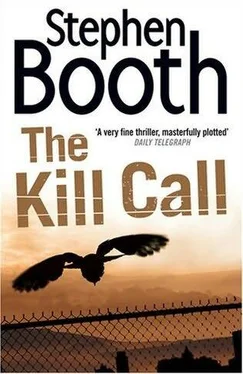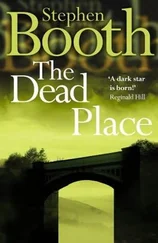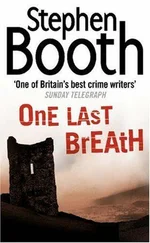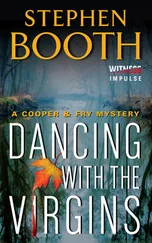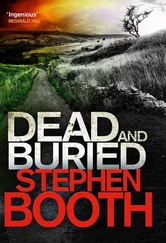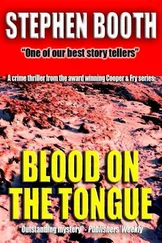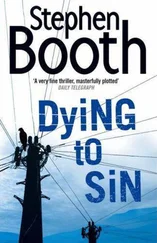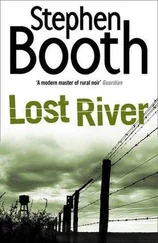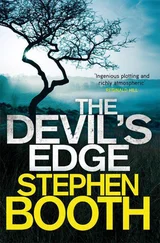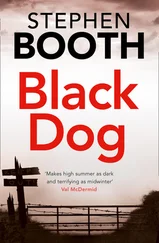Stephen Booth - The kill call
Здесь есть возможность читать онлайн «Stephen Booth - The kill call» — ознакомительный отрывок электронной книги совершенно бесплатно, а после прочтения отрывка купить полную версию. В некоторых случаях можно слушать аудио, скачать через торрент в формате fb2 и присутствует краткое содержание. Жанр: Полицейский детектив, на английском языке. Описание произведения, (предисловие) а так же отзывы посетителей доступны на портале библиотеки ЛибКат.
- Название:The kill call
- Автор:
- Жанр:
- Год:неизвестен
- ISBN:нет данных
- Рейтинг книги:4 / 5. Голосов: 1
-
Избранное:Добавить в избранное
- Отзывы:
-
Ваша оценка:
- 80
- 1
- 2
- 3
- 4
- 5
The kill call: краткое содержание, описание и аннотация
Предлагаем к чтению аннотацию, описание, краткое содержание или предисловие (зависит от того, что написал сам автор книги «The kill call»). Если вы не нашли необходимую информацию о книге — напишите в комментариях, мы постараемся отыскать её.
The kill call — читать онлайн ознакомительный отрывок
Ниже представлен текст книги, разбитый по страницам. Система сохранения места последней прочитанной страницы, позволяет с удобством читать онлайн бесплатно книгу «The kill call», без необходимости каждый раз заново искать на чём Вы остановились. Поставьте закладку, и сможете в любой момент перейти на страницу, на которой закончили чтение.
Интервал:
Закладка:
Stephen Booth
The kill call
1
Journal of 1968
In those days, there were always just the three of us. Three bodies close together, down there in the cold, with the water seeping through the concrete floor, and a chill striking deep into flesh and bone. The three of us, crouching in the gloom, waiting for a signal that would never come.
And what a place to wait and watch in. Seven feet high and seven feet wide — it might as well have been a giant coffin. But slam down the lid and blot out the sun, and we’d survive. Oh, yes. For fourteen days, we’d survive. Thinking about all the things we’d hoped for, and the way our lives could be snuffed out, just like that.
One night, Jimmy looked up from his bunk at me and Les, and he said we were like the three little pigs, or the three billy goats gruff. Well, I don’t know about that. Three blind mice, maybe — it would be more fitting. If it all kicked off, the three of us would be as good as blind. Blinded by a million suns. Blind to the people dying.
A few of the details are a bit dim now. Age does that to you. But other things are as bright and stark in my mind as if they’d been burnt there by a lightning flash. Faces and eyes are what I remember most. Faces in the dark. Eyes turned up towards the light. That look in the eyes a second before death.
Yet all we had down there was a miserable six-watt bulb. I don’t think they even make bulbs that small any more, do they? No wonder your sight could get damaged. Then, every ninety minutes, the switch would pop and it went totally dark. Black as a cat in a coal hole. I always hated that. Even now, complete darkness is what frightens me most. You never know what might be coming up right next to you in the dark.
But it’s amazing how you can adapt to it, for a while. With that one little bulb, we could see pretty well in the murk, well enough to read and do what was necessary.
The place was shocking damp, too. I don’t know what they’d done wrong when they built it, but Les said it hadn’t been tanked. Les was our number one, and he might have been right, for once. The water seemed to soak right through the walls from the soil. It was particularly bad in the winter, or after a heavy rain, which happens a mite too often in Derbyshire. Some nights, if it were siling down, it would be all hands to the pump.
And that was the three of us. Me, Les, and poor old Jimmy. Always three, except for the time that we didn’t ever talk about.
A lot of things seem to come in threes, don’t they? The Holy Trinity, the Three Wise Men, the Third World War. There must be something magic about the number. Perhaps it’s to do with the Earth being the third planet from the Sun. Or the fact that we see the world in three dimensions — even if your world happens to be only seven feet wide and seven feet high.
Well, times change so much. The years pass and the world turns, and suddenly no one cares, and no one wants you any more. They take away your friends, your pride, your reason for living. But they can’t ever wipe out your memories. Sometimes, I wish they would. If only they could take away the nightmares, free me from the memory of those damp concrete walls and the icy darkness, and the memory of a face, staring up at the light.
And that’s another funny thing. They say bad luck comes in threes, don’t they? I think I always knew that.
But here’s something I didn’t know. It turns out that people die in threes, too.
2
March 2009, Tuesday
Old buildings drew Sean Crabbe like a bee to honey. The more neglected they were, the better he liked them. He couldn’t really explain the appeal. It might have been something to do with the history that clung to the walls, the lives of long-dead people written in the dust, their stories forever trapped in cobwebs hanging from broken ceilings.
That was why the old Nissen huts above Birchlow were one of his favourite places. He made his way there whenever he got the chance, bunking off from college or just disappearing on a weekend, when no one cared what he was up to. No one else ever went up to the huts any more — not since the homeless man had died there, wrapped up in a roll of plastic sheeting with empty cans scattered around him, a cold morning light glinting on the last drops of his beer as they dribbled across the floor.
Sean had been there on that morning, had found the old derelict lying in his pool of Special Brew, and had walked away to try somewhere else. Next day, he’d watched from the hillside as the police and paramedics made their way to the site. He wondered why they’d sent an ambulance when any fool could see that the man was long since dead.
Some folk said that the place was cursed now, haunted by the ghost of the drunken vagrant. So that was why Sean was always on his own at the old huts. And it was just the way he liked it.
There was one big building that was almost intact, with damp brick walls and corrugated-iron sheets banging in the wind. Its purpose was a mystery to him, but he didn’t really care. There were a few small rooms that might have been offices, a kitchen that still had a filthy sink in it, and a bigger space with a concrete floor and shelves along the walls, like a workshop. He liked the narrow corridors best, the floorboards that had warped from the damp and seemed to move with him as he crossed from room to room, and the peeling paint of the doorways where he could imagine anything waiting behind them to be found.
In a way, whenever he pushed open one of those doors, he was entering a different world, stepping through into the past. He wondered if the past had been a better world than the one he was in right now.
This morning, Sean’s need to escape had been urgent. His BTEC course at the further education college was turning out to be a waste of time, useless for his chances of finding the media career he’d dreamed of. The money he’d saved doing holiday jobs had long since run out. All those hours washing caravans and picking up rubbish hadn’t kept him in course fees for long, and now he owed his parents for a loan to see him through. His girlfriend had dumped him weeks ago, because she said he was mean. If he could call her a girlfriend. Most of the girls thought he was geeky. But, if he was a geek, why wasn’t he cleverer at passing exams and doing assignments?
And, to cap it all, a bunch of kids had mugged him last night outside the pub and nicked his phone. Lucky he didn’t have his iPod with him at the time, but losing the Nokia was a real pain. His parents had shelled out for it, and he couldn’t face telling them that he’d lost it.
It was pity there was no sun, though. A patch of thin, lattice-like wood had been exposed up there in the roof space, and when the sunlight shone through, it cast shadows across the floor. Then Sean could pretend he was a child, avoiding the cracks on the pavement. Here, he could step from light to light, avoiding the dark shadows as if they were traps, holes where evil lurked. Step from light to light, and avoid the shadows. If only life was so easy.
But there was no sun today. Just the rain clattering on the corrugated iron, blowing through the splintered windows, streaming down the walls. He was already wet when he arrived at the huts, and the chill made him shiver inside his parka.
Mouldy, fusty, stale and mildewed. Those were the familiar smells of the hut. If the weather was warm, he could scent an underlying odour of oil or grease, saturated into the concrete from whatever had gone on in here. That smell must have lasted decades. Fifty, sixty years? The buildings must be from about that time. They were so old-fashioned, so last century. It was hard for him to imagine what anyone might have done up here, stuck on an empty hillside in Derbyshire.
Читать дальшеИнтервал:
Закладка:
Похожие книги на «The kill call»
Представляем Вашему вниманию похожие книги на «The kill call» списком для выбора. Мы отобрали схожую по названию и смыслу литературу в надежде предоставить читателям больше вариантов отыскать новые, интересные, ещё непрочитанные произведения.
Обсуждение, отзывы о книге «The kill call» и просто собственные мнения читателей. Оставьте ваши комментарии, напишите, что Вы думаете о произведении, его смысле или главных героях. Укажите что конкретно понравилось, а что нет, и почему Вы так считаете.
